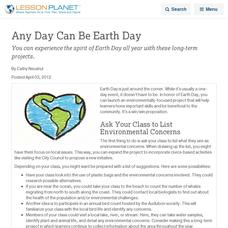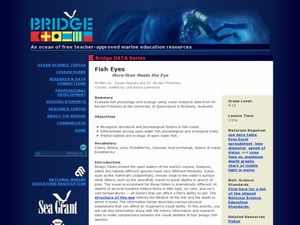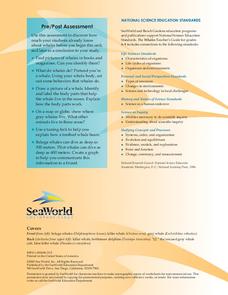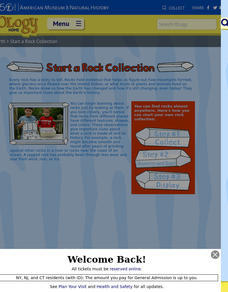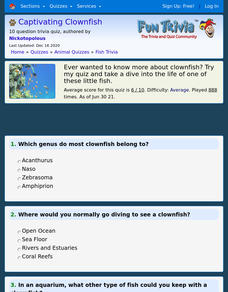Curated OER
Any Day Can Be Earth Day
You can make the spirit of Earth Day last year round with these long-term projects.
Curated OER
Fish Eyes - More than Meets the Eye
Inform your class about the adaptations in fish eyes: cones, lens size, endothermy, and speed of vision. The adaptations are related to diving behavior. Junior marine scientists compare the adaptations of four different fish species to...
University of California
Plankton
Plankton: so much more than just a SpongeBob character. Three different activities have kids looking at both phytoplankton and zooplankton in pictures, as well as collecting their own samples (depending on your access to a saltwater...
K12 Reader
Natural Resources
What natural resources are available in your area? Your learners can consider this question after reading a brief passage about natural and renewable resources. After reading, class members respond to five questions related to the reading.
Curated OER
Lizard Lab
In this detailed and comprehensive multi-day activity, budding evolutionary biologists use real data from lizard populations in the Canary Islands to examine evolution and natural selection.
California Academy of Science
Academy Seafood Market and Fishery
What fishing method is the most sustainable? Find out through a fun, but meaningful game in which your little fishermen use different techniques to see what they catch. After the fishing activity is over, there are several discussion...
Sea World
Whales
A whale of a lesson is sure to intrigue your elementary oceanographers! Learn about the mammals of the sea with a series of activities about whales, dolphins, and porpoises. Kids complete worksheets about the anatomy of a whale, create a...
National Park Service
The Water Cycle Game
Take young scientists on a trip through the water cycle with this interactive science activity. After setting up a series of ten stations representing the different places water can be found, children use the included printable dice to...
Poetry Class
Tackling Climate Change
Get your kids thinking about climate change with a series of activities that include creating a ditty box poem for the planet, a poem that identifies concepts or objects they would want to preserve.
It's About Time
The Changing Geography of Your Community
Lead your class in exploring their local communities as well as the general environment. As they determine continental distributions by investigating minerals, rocks, and fossils located in their local region, pupils construct a...
Chicago Botanic Garden
Review and Assessment: Causes and Effects of Climate Changes
The last activity in the series of five is a short one where individuals show what they've learned about the causes and effects of climate change. Working independently, they fill in a graphic organizer, then compare their notes with a...
K5 Learning
Landforms
Valleys, mountains, and plateaus are just a few geographic landforms on our Earth. Read about these types and more in a brief landform passage. After reading, learners respond to six short answer comprehension questions.
K5 Learning
Sharks
"Dun dun... dun dun." A shark! After second graders read a four-paragraph passage about sharks, they respond to four reading comprehension questions that use the text as a basis for the answers.
Channel Islands Film
Dark Water: Lesson Plan 2 - Grade 3
A discussion of bioluminescence launches an investigation of animal adaptations. After re-watching the opening minutes of Dark Water, class members listen to a reading of What Do You Do with a Tail Like This, and then create a new animal...
Howard Hughes Medical Institute
Modeling Trophic Cascades
In the ecological game of who eats who, one small change can have a big impact! Individuals create food chains in an array of ecosystems, then determine what happens to organisms in the chain when one organism changes its feeding...
Curated OER
Bottled Water Ban
Convenience, taste, portability ... what's not to love about bottled water? Apparently, a lot. Scholars analyze the four main arguments supporting and opposing the sale of bottled water. They explore the health, environmental, and...
Syracuse University
Erie Canal
While canals are not the way to travel today, in the first half of the nineteenth century, they were sometimes the best way to move goods and people. Scholars examine primary sources, including maps and pictures, to investigate the role...
American Museum of Natural History
Start a Rock Collection
Rocks hold evidence of Earth's past. A three-step guide describes the process of creating a rock collection. It provides a data collection sheet to make notes about each sample.
PBS
Star Power
Let there be light—or maybe not. Pupils learn about light pollution with an investigation of constellations. They create constellation boxes and experiment with different levels of light. Observations are then made about the lighting in...
Curated OER
Stranded along the Coast
Pupils plot stranding sites onto a map using latitude and longitude as well as compass directions with respect to coastal features. They identify several species of marine animals that might become stranded; distinguish their...
Curated OER
Ocean Animals Picture Matching Worksheet
In this picture matching worksheet, students draw lines to match 6 color pictures of common ocean animals to their identical copies in another column.
Curated OER
Those Amazing Seahorses
In this online quiz activity, learners answer a set of questions about seahorses. Page has a link to submit answers for correction.
Curated OER
Captivating Clownfish Quiz
In this online quiz worksheet, students answer a set of multiple choice questions about clownfish. Page includes links to answers and resources.
Curated OER
General Shark Facts-Trivia Quiz
In this online quiz worksheet, learners answer a set of trivia questions about general shark facts. Page has a link to submit answers for review.
Other popular searches
- Ocean Ecosystems Animals
- Oceanic Trenches and Animals
- Grassland Animals Ocean
- Ocean Plants and Animals
- Oceans Animals
- Oceanic Animals Adaptations


